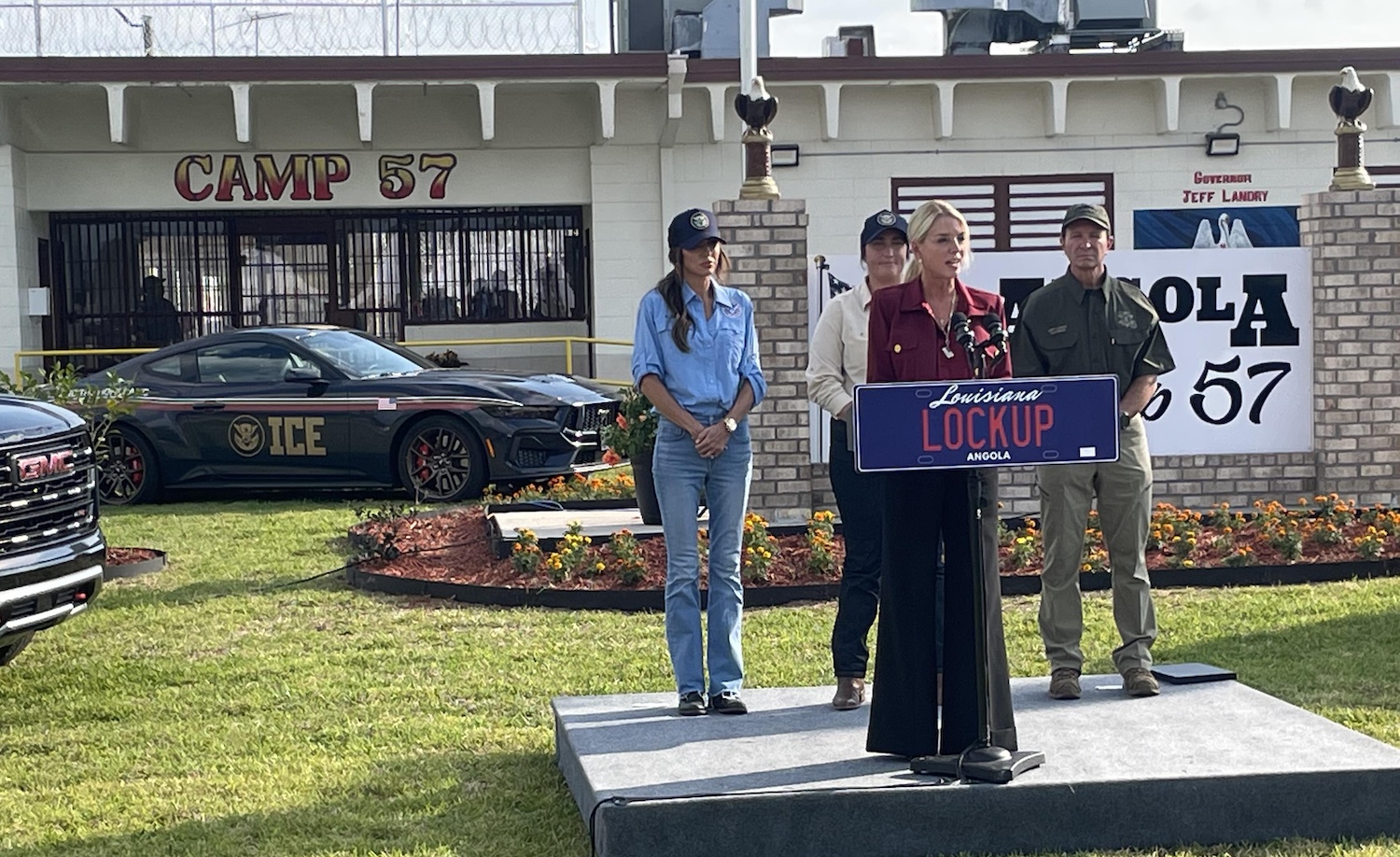by Piper Hutchinson, Louisiana Illuminator
ANGOLA – A section of the Louisiana State Penitentiary undergoing emergency repairs is being used to house Immigration and Customs Enforcement detainees, Gov. Jeff Landry and officials with the Trump administration announced Wednesday.
Landry said the facility “will house the worst of the worst criminal illegal aliens arrested by ICE.”
A complex at the state prison is already being used to house 51 detainees and has a total capacity of 416.
Joining Landry at the prison to make the announcement were U.S. Attorney General Pam Bondi, Homeland Security Secretary Kristi Noem and ICE Deputy Director Madison Sheehan, who previously served as Landry’s Wildlife and Fisheries secretary.
“Louisiana, you’re going to be an example for the rest of this country,” Bondi said.
Landry declared a state emergency in late July to allow the expedited repair of Camp J at Angola. The four-building complex had been closed since 2018, with its only use as a quarantine site during the COVID-19 pandemic.
Neither the governor nor Noem shared whether the facility will be used as a post-conviction facility or as another ICE detention center where detainees await charges or trial.
The detainees will join more than 4,000 inmates at Louisiana State Penitentiary, which stands on the site of a former slave plantation that is still a working farm now staffed with prisoners.
Workers on the prison’s “farm line,” who pick vegetables that help feed the prisoners, are currently suing the state, alleging dangerous working conditions. Inmates at Angola can earn a maximum of $8 a week, regardless of the type of work they do.
Landry touted Angola’s natural features, including “forests full of bears” and “swamps full of alligators” as among the new facility’s safety features.
The Camp J section of the prison where ICE detainees are being held was once known as the “Dungeon.” It was designated as solitary confinement to segregate prisoners for disciplinary reasons. Prison officials closed it seven years ago after its cell locks malfunctioned, allowing inmates to evade security checks. Dozens of weapons were discovered after its closure, and more than 80 prison employees quit, retired or were fired related to misconduct at Camp J.
Though it was rumored Camp J would be renamed Camp 47 to honor President Donald Trump, it has instead been renamed Camp 57 in honor of Landry, the 57th governor of Louisiana.
The governor also referred to the facility as “Louisiana Lockup,” a title that was featured prominently on an oversized licensed plate that adorned the lectern he, Bondi and Noem used at a news conference in front of the facility.
Landry’s emergency order in late July suspended state procurement code and public bid law to allow the officials to secure any materials and write or amend any contracts needed to respond to the emergency.
Despite being asked by reporters multiple times, Landry would not disclose how much money the state spent on renovations or operations or whether the federal government would reimburse the state for any of its costs.

Sheehan said the facility has been brought up to ICE standards, and detainees will have access to attorneys and a law library.
Aside from its state penitentiary, Louisiana has become a go-to location for the Trump administration since it placed a heightened emphasis on immigration enforcement in January. The state’s nine ICE processing and detentions centers have a combined capacity of 6,000 people, second only to Texas with more than 28,000.
Louisiana State Penitentiary has room to hold more than 6,000 incarcerated people. Its population was 4,253 as of June 30, according to the most recent statistics from the Louisiana Department of Corrections and Public Safety.
Immigrant rights advocates say the Louisiana ICE facilities have been full for several months because Bondi and the U.S. Department of Justice consider federal courts in the South to be more friendly venues for its immigration cases.
According to data analysis from the Deportation Data Project, Immigration and Customs Enforcement arrested 1,989 people in Louisiana from when Trump returned to office Jan. 20 through June 26. More than half of those arrestees have since been deported or removed from the United States.
The analysis also found that just 6% of ICE arrests in Louisiana over the period were convicted violent criminals.
Related: Trump Policies Will Stress Big Cities
Critics of the Trump administration’s approach to immigration have called on federal courts to uphold the U.S. Constitution’s requirement of due process for persons who are arrested. They note the vast majority of immigrant detainees have not been allowed to post bail while awaiting trial and are therefore unable to build their defense and secure witnesses.

